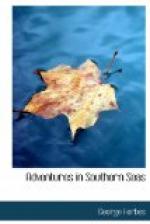When the repairs to our ship had been effected, we hauled our wind, and stood away northward, when we found ourselves surrounded by masses of floating ice. In no record of any voyage that Hartog or I knew of is any mention made of this phenomenon, so we concluded we were the first to see it. The farther we went the more numerous became the icebergs, and the more difficult the navigation owing to fogs and mists. The whole surface of the water as far as the eye could reach was covered by dense masses of ice, and had not the breeze freshened so that we were able to avoid the ice pack, we might never have made our way to the open sea. Some of the icebergs were beautifully formed, and the countless prisms of which they were composed glowed in the sun’s rays with the delicate colour of the rainbow.
Next day the wind had fallen to a calm, and we rode upon a sea of glass. We had left the pack ice, but before us stretched an island of such extent that the end of it could not be seen. This island rose to the height of twenty feet. It was perfectly flat, with steep, perpendicular sides, which made it inaccessible to man. From the masthead, however, it was possible to observe its surface, which we saw to be covered by a vast number of penguins, so we knew a landing must be available somewhere, for these birds are wingless. This island was composed entirely of ice, it being, as Hartog reckoned, a glacier which had broken off from the main continent into the sea. It was drifting north, and would gradually melt in the warmer atmosphere to which the current was taking it, but many years must elapse before this would happen.
That evening we remained in the vicinity of the island. The twilight of this region in which we now found ourselves continued without fading into night, and to add to the beauty of the scene an aureola appeared in the sky. It was a sight, once seen, never to be forgotten. A world of perpetual day.
With the return of sunlight Hartog determined, if possible, to effect a landing, and leaving the “Arms of Amsterdam” in charge of Janstins, the cutter was manned, in which the captain and I set out for the shore. After pulling for some distance; and when almost out of sight of our ship, we came to a kind of platform where the ice was broken, making it possible to climb to the top of the island. We had no sooner set foot there than we were surrounded by penguins. They came waddling towards us in the most comical fashion, nor were they in the least afraid of us. The presence of man for the first time in these latitudes appeared to inspire them more with curiosity than alarm.




